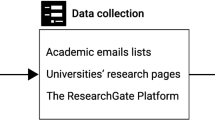Abstract
J. Angelo Corlett’s response to Leigh Turner defends the current practice of anonymous refereeing in scholarly journals. In reply to him: a slightly refined proposal for signed referees’ reports, with temporarily blind refereeing, would restore to the process of publication, in philosophy at least, the sense of responsibility for rational debate, cooperation, mutual criticism, and simple courtesy which is expected among colleagues in public academic relations, and would also allow more credit for the difficult task for refereeing. Personal observation of the quality of referees’ reports suggests that a gathering of anecdotal evidence would show the need for reform.
Similar content being viewed by others
Notes
Corlett, J. A. (2005). Ethical issues in journal peer-review. Journal of Academic Ethics, 2(4), 355–366.
Turner, L. (2003). Doffing the mask: Why manuscript reviewers ought to be identifiable. Journal of Academic Ethics, 1(1), 41–48; Promoting F.A.I.T.H in peer review: Five core attributes in effective peer review. Journal of Academic Ethics, 1(2), 181–188.
Shakespeare, Love’s Labours Lost, Act V, Scene ii, 621.
In this vein of promoting responsible and personal relations, let me comment on one additional but related issue which may be coming into view. It is understandable that, under the pressure of the great and very valuable labour editors undertake, some journals should function as collectives, and share the decision making function out to combinations of individuals drawn from the whole group. But in such a case it seems an unacceptable loss of normal collegial relations for the author to receive only a secretarial report which fails to identify those who made the judgment. I know of more than one journal where this is the regular practice. One form of transparency that needs to be preserved is for authors to know who the editors are they are dealing with, those who take responsibility for the decisions reached, whether on the basis of referees’ reports or of their judgment about what referees if any are appropriate. An anonymous referee points out another related issue, asking whether it is not a more serious ethical deficiency for editors to fail to provide authors with referees’ comments, and with reasons supporting their decisions, thus depriving authors of valuable criticism. This certainly does occur, and I agree that ‘the ethical acceptability of this practice deserves discussion’. In the present case, anonymity has deprived the referee of personal credit for this and other valuable criticism.
I am grateful for comments on an earlier draft from Alister Browne, Martin Meissner, and Robert Ware, and for valuable criticism from an anonymous referee.
Author information
Authors and Affiliations
Corresponding author
Rights and permissions
About this article
Cite this article
Brown, D.G. On Doffing the Mask. J Acad Ethics 5, 217–219 (2007). https://doi.org/10.1007/s10805-007-9034-8
Received:
Accepted:
Published:
Issue Date:
DOI: https://doi.org/10.1007/s10805-007-9034-8




